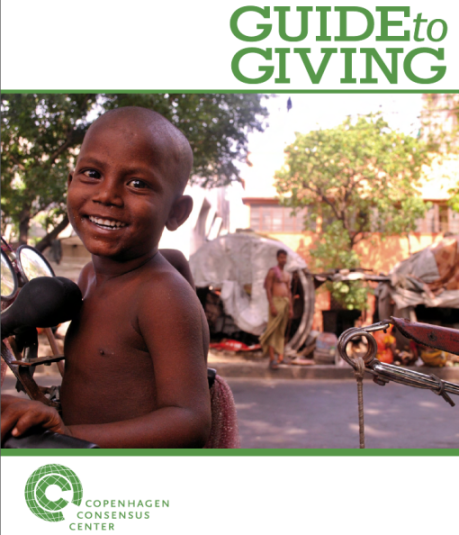Guide to Giving
Policy Advice
Even the wealthiest government, business, or individual has limited resources. A dollar spent in one place cannot be spent elsewhere. When we say that we want to do everything, we are deceiving ourselves – because that is not what happens in practice. A few big issues get the most air-time, attention, and money.
Mankind’s lot has improved in many measurable ways. In 1900 we lived for an average of 30 years; today we live for nearly 69. We lead healthier, more prosperous lives than we ever have before. This does not, however, mean that everything is good enough.
Although in many areas we are on the right track, too often today scarce resources are spent responding ineffectively to a few big issues that attract celebrity attention and devour much of the media’s limited interest. We hear relatively little about many major global problems that have reasonably cheap solutions. Despite our progress, today, one billion people lack clean drinking water. Two billion lack sanitation. Three billion lack basic micronutrients. One quarter of all deaths this year will be caused by infectious diseases that we could easily combat.
The think-tank the Copenhagen Consensus Center, based in Denmark, works to ensure that basic principles of economics are used to improve the allocation of aid and development money. We want to help ensure that progress in tackling global challenges is swift. We work with academics and Nobel Laureate economists to provide sound information for governments, philanthropists, and NGOs. Fundamentally, the Center promotes the idea that careful use of economic science can help ensure that we achieve the most good for people and the planet.
The Copenhagen Consensus Center is often asked by individuals: how can I make personal donations in line with the Center’s research findings?
We commission research that analyzes the optimal ways to combat the biggest problems facing the world. What we advocate – prioritization – is not easy. It is much easier to declare that we want to tackle every major world problem. Unfortunately, doing so is just a dream. Even the wealthiest government or business has limited resources. A dollar spent in one place cannot be spent elsewhere. When we say that we want to do everything, we are deceiving ourselves – because that is not what happens in practice. A few big issues get the most air-time, attention, and money.
Our steadfast belief is that in a world fraught with competing causes for attention, we need to direct more resources to the areas where we could achieve the most. Our Center’s flagship projects are our four-yearly analyses of global challenges. The first was held in 2004, and prompted The Economist to declare that the Copenhagen Consensus was “an outstanding, visionary idea”. The most recent Copenhagen Consensus was held in 2008, and produced pioneering economic research that will help shape policy debate and discussion for many years to come.
The Giving Guide attempts to provide an answer to that question, and to make our economic research accessible for many more people.


